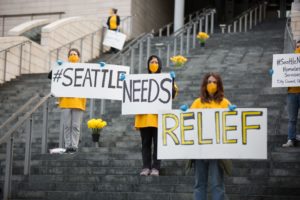
Photo credit: Alex Garland
Seattle residents and members of the Transit Riders Union gathered outside City Hall Wednesday morning to call for a greater city response to the impacts of COVID-19 on Seattle workers, residents and small businesses, calling on Mayor Durkan and the Seattle City Council to pass economic relief measures funded with new progressive revenue. On Wednesday, the City Council’s Select Budget Committee discussed the needs created by the coronavirus recession and a proposal to raise new revenue through a payroll tax on large businesses.
Each week the toll of the COVID-19 pandemic gets worse in our city. Federal and state aid is helping but has left enormous gaps, and the City’s response so far to assist small businesses, people struggling to pay rent and bills, and people experiencing homelessness has fallen far short of the need. The City has not yet implemented widespread relief programs or a long-term funding mechanism for what is likely to be a years-long recovery process.
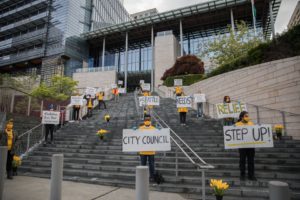
Photo credit: Alex Garland
“There aren’t nearly enough restrooms, hand washing stations and showers, especially ones that are wheelchair accessible,” said Kristina Sawyckyj, a homeless vehicle resident and wheelchair user, and TRU’s Disability & Access Officer. “With the libraries and community centers closed, it’s hard to find a place to charge a cell phone, laptop, wheelchair or other medical equipment. Without internet we can’t reach medical providers or get information about the pandemic. There has been a great reduction in food banks and soup kitchens available for those struggling with food security. Homeless individuals must travel great lengths within the city to get basic meals. Water, toilets, food and housing are human rights. In this day and age, a charged cell phone is a human right.”
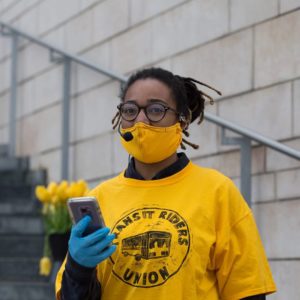
Photo credit: Alex Garland
“Covid-19 has drastically affected my business. I may not be able to go back to work or will have to drastically change the way I work,” said massage therapist Heidi DeAndrade. “In my practice I am hands on with clients. I have been in practice for 15 years and have a physical location. I have grown a successful business and was looking to hire staff. This pandemic has forced me to look into other means to support myself and family. The amount of funding available for small business is far from sufficient. SBA considers companies with 10 billion in assets as small business. There are many wonderful “real” small businesses who are not getting access to funding. If funding for the “real” small business doesn’t become available, I feel that many won’t make it.”
“We devoted our time, our resources, and our bodies to elect what was supposed to be the most progressive city council Seattle has ever seen,” said Tye Reed, a TRU organizer and a housing case manager working with families facing eviction in King County. “And yet nothing is being done to provide support for the thousands of people out of work with no income on the horizon. Nothing is being done for the thousands of Seattleites facing an eviction in June with no plan for rental relief.”
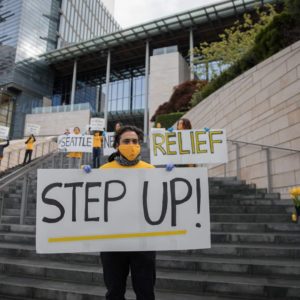
Photo credit: Alex Garland
“I’m a Primary Care Nurse Practitioner working on the front lines in community health,” said Simon M. Taylor, ARNP. “I’m also immunocompromised – that means that in order to stay healthy and keep taking care of my patients I can’t work as many hours in the clinic as I used to. They raised my rent this month. So even as my income went down, my rent went up. When I asked if the large corporate landlord could help – they said no. In the middle of a pandemic I’m a nurse working the front lines and I am struggling to make rent. I need the support of the city to build affordable housing that can help relieve the financial pressure for healthcare and non-profit workers. Amazon is a central part of the economic cycle that pushes up rents in our city. The people of Seattle have made Amazon and Jeff Bezos rich, it’s time they do their part for the people of Seattle. We need a big business tax, and we need it now. Nurses need help.”
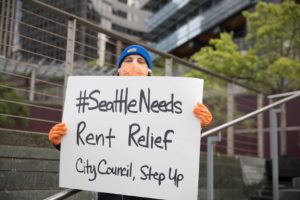
Photo credit: Alex Garlard
“Where I imagine an opportunity to use a global crisis to bring people indoors, to elicit the compassion required to turn public opinion toward permanent answers, I’m instead seeing less official services rather than more,” said Dee Powers, a vehicle resident who is high risk for developing complications if she were to catch COVID-19. “We used to get given trash bags if we made an effort to be where the trash bag people would be each week. We don’t see them anymore. It feels like the city has forgotten about the people who cannot self-isolate, who cannot just go home and stay there. The people with disabilities and underlying health conditions being discharged from hospitals without a shelter referral. I saw a request on Facebook the other day from a Harborview RN helping with the respite care program asking for donations of used tents and sleeping bags because they were no longer able to send their medically fragile discharges to respite shelters and wanted to give them some minimum of shelter from the elements.”
“As a creative, the pandemic has affected every aspect of my life,” said Just Marshall, a Black artist in the South End. “The Marshall Law Band was planning on going on a 50-day national tour that we put countless of hours of collective work into. This loss of wages and more importantly time, has left us all scrambling to understand our new role in the community as musicians. So far, my friends and I have struggled to receive any paying gigs. Unfortunately working tirelessly on my craft and providing art for little to no money is something I’ve grown accustom to. However, with no shows or government relief in place, times are tougher than ever.”
